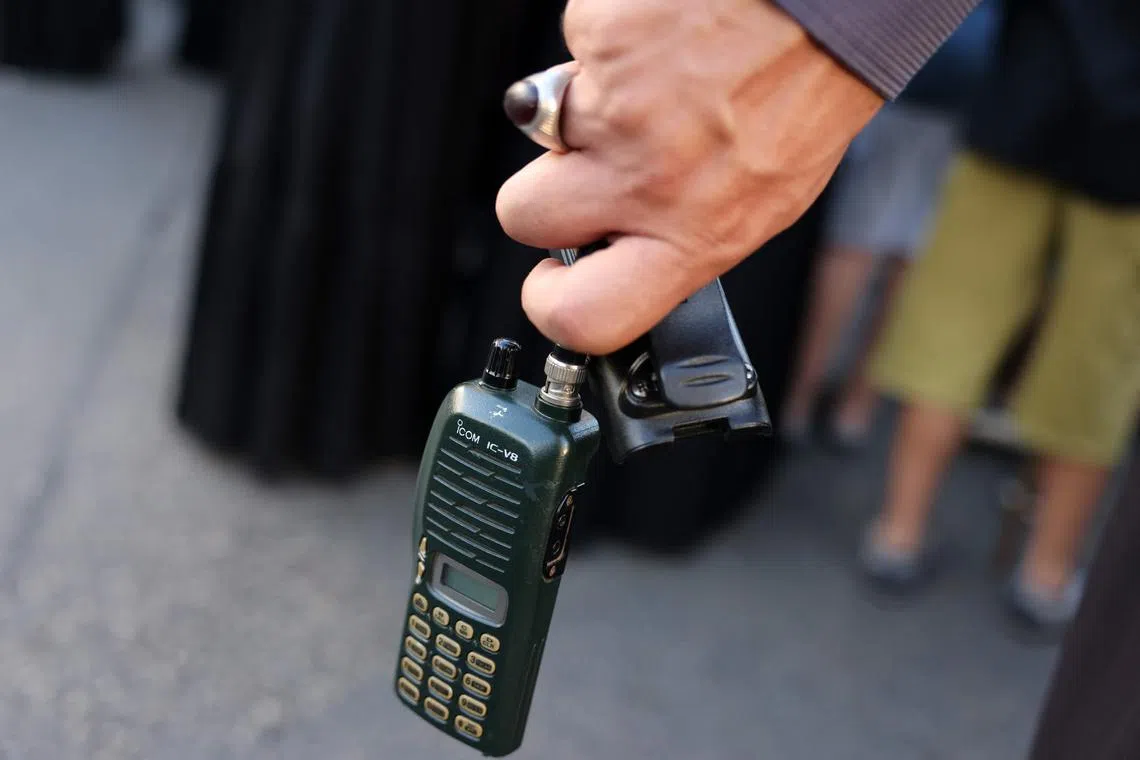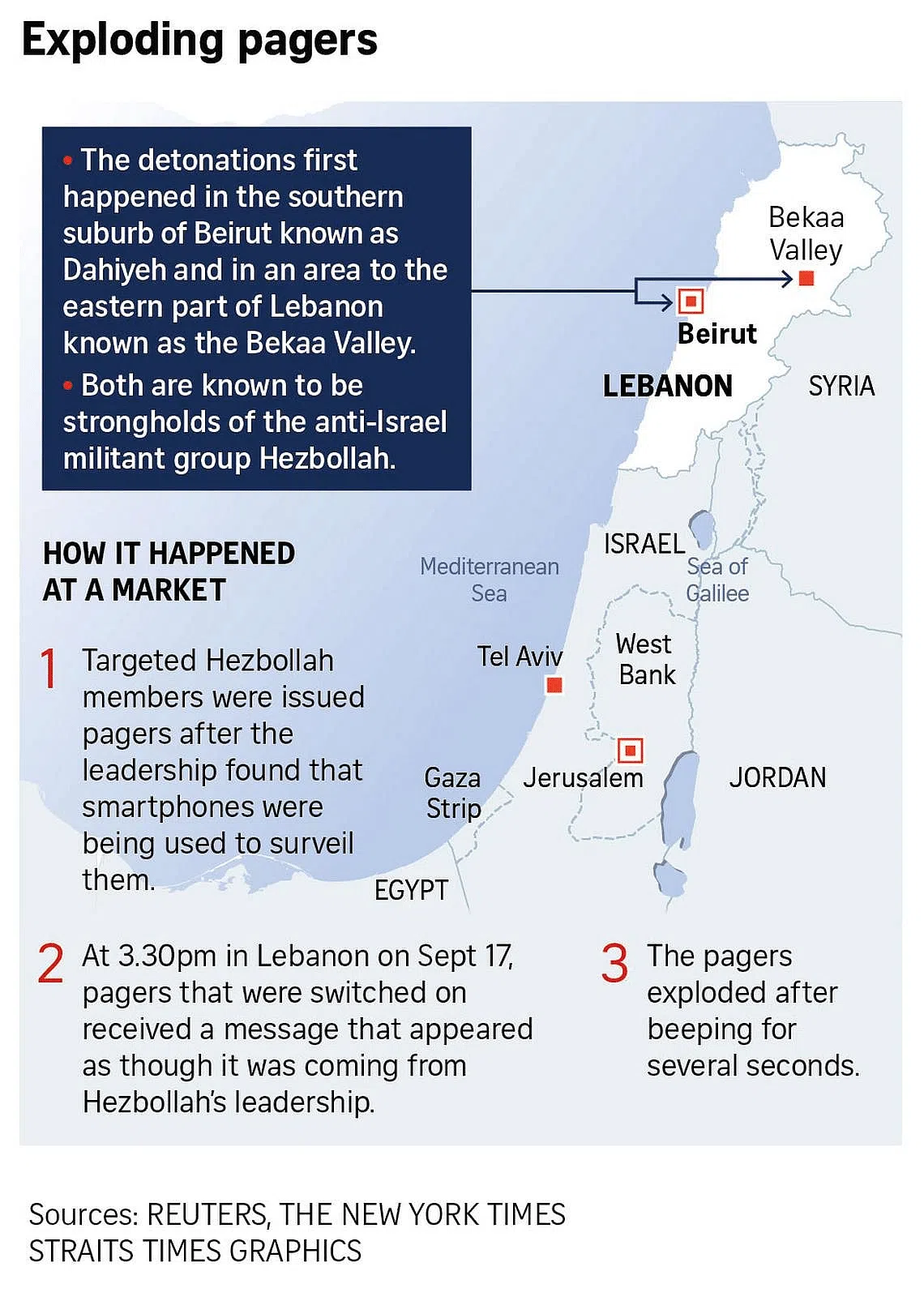Fears of all-out war as new wave of Lebanon device blasts kills 20, wounds 450
Sign up now: Get ST's newsletters delivered to your inbox
BEIRUT – Hezbollah was in disarray on Sept 19 after a second wave of deadly explosions swept through its strongholds across Lebanon, putting pressure on its leader to exact revenge for the operation it blames on Israel.
The attacks killed 32 people in two days, including two children, and wounded more than 3,000 others, according to Lebanese Health Ministry figures.
The ministry said 20 people were killed and more than 450 injured on Sept 18 in Beirut’s suburbs and the Bekaa Valley when their walkie-talkies that had been covertly turned into mini-bombs exploded.
At least one of the blasts took place near a funeral organised by Hezbollah for those killed on Sept 17, when thousands of pagers used by its members exploded in supermarkets and on streets across Lebanon
The death toll from those explosions rose to 12, with nearly 3,000 injured.
Israel has not commented on the unprecedented operation.
But its Defence Minister Yoav Gallant said on Sept 18, in reference to Israel’s border with Lebanon: “The centre of gravity is moving northward.”
“We are at the start of a new phase in the war,” he said.
Hezbollah said Israel was “fully responsible for this criminal aggression” and vowed revenge.
On Sept 18, the group fired around 20 projectiles into Israel, most of which were intercepted by air defence systems without causing any injuries, the Israeli military said.
Israeli responded by hitting multiple targets in southern Lebanon.

A man holding a walkie talkie device after removing the battery, at a funeral in the suburbs of Beirut for someone killed the previous day by an exploding pager.
PHOTO: AFP
Lebanese Foreign Minister Abdallah Bou Habib warned the “blatant assault on Lebanon’s sovereignty and security” was a dangerous development that could “signal a wider war”.
Iran’s envoy to the United Nations said the country “reserves the right to take retaliatory measures” after its ambassador in Beirut was wounded in the blasts.
The White House warned all sides
“We don’t believe that the way to solve where we’re at in this crisis is by additional military operations at all,” US National Security Council spokesman John Kirby told reporters.
The influx of so many casualties all at once overwhelmed hospitals in Hezbollah strongholds.
At a Beirut hospital, doctor Joelle Khadra said “the injuries were mainly to the eyes and hands, with finger amputations, shrapnel in the eyes – some people lost their sight.”
A doctor at another hospital in the Lebanese capital said he had worked through the night and that the injuries were “out of this world – never seen anything like it”.
Heavy blow
Analysts said operatives had likely planted explosives on the paging devices before they were delivered to Hezbollah.
“A small plastic explosive was almost certainly concealed alongside the battery, for remote detonation via a call or page,” said Mr Charles Lister, of the Middle East Institute.
Among the dead was the 10-year-old daughter of a Hezbollah member, killed in east Lebanon’s Bekaa Valley when her father’s pager exploded, the family and a source close to the group said.
The attack dealt a heavy blow to Hezbollah,
The preliminary findings of a Lebanese investigation into the blasts found the pagers had been booby-trapped, a security official said.
“Data indicates the devices were pre-programmed to detonate and contained explosive materials planted next to the battery,” the official said, requesting anonymity to discuss sensitive matters.
A source close to Hezbollah, asking not to be identified, said the pagers were “recently imported” and appeared to have been “sabotaged at source”.
After The New York Times reported the pagers had been ordered from Taiwanese manufacturer Gold Apollo, the company said they had been produced by its Hungarian partner BAC Consulting KFT.
A government spokesman in Budapest said the company was “a trading intermediary, with no manufacturing or operational site in Hungary”.
Japanese firm Icom said it had stopped producing the model of radios reportedly used in the Sept 18 blasts in Lebanon around 10 years ago.
As fears again surged of a regional conflagration nearly a year into the Gaza war, Lufthansa and Air France announced the suspension of flights to Tel Aviv, Tehran and Beirut until Sept 19.

‘Extremely volatile’
Since October, the unabating exchanges of fire between Israeli troops and Hezbollah have killed hundreds of mostly fighters in Lebanon, and dozens including soldiers on the Israeli side.
They have also forced tens of thousands of people on both sides of the border to flee their homes.
United Nations rights chief Volker Turk said the Sept 17 attack had come at an “extremely volatile time”, calling the blasts “shocking” and their impact on civilians “unacceptable”.
UN chief Antonio Guterres urged governments “not to weaponise civilian objects”.
Senior diplomats from the United States, Britain, Germany, France and Italy will meet on Sept 19 in Paris to discuss the spiralling tensions in the Middle East, sources said, ahead of a UN Security Council meeting planned for Sept 20.
The Oct 7 attack that sparked the war resulted in the deaths of 1,205 people, mostly civilians, on the Israeli side, according to an AFP tally based on official Israeli figures which includes hostages killed in captivity.
Out of 251 hostages seized by militants, 97 are still held in Gaza, including 33 the Israeli military says are dead.
Israel’s retaliatory military offensive has killed at least 41,272 people in Gaza, most of them civilians, according to data provided by the Hamas-run territory’s health ministry. The UN has acknowledged these figures as reliable.
In Gaza on Sept 18, the civil defence agency said an Israeli air strike on a school-turned-shelter killed five people, while the Israeli military said it targeted Hamas militants. AFP


